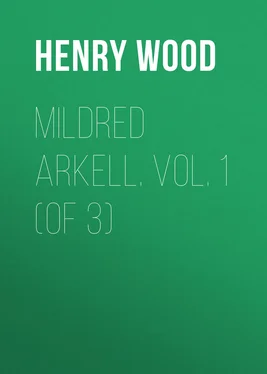Henry Wood - Mildred Arkell. Vol. 1 (of 3)
Здесь есть возможность читать онлайн «Henry Wood - Mildred Arkell. Vol. 1 (of 3)» — ознакомительный отрывок электронной книги совершенно бесплатно, а после прочтения отрывка купить полную версию. В некоторых случаях можно слушать аудио, скачать через торрент в формате fb2 и присутствует краткое содержание. Жанр: foreign_sf, literature_19, foreign_antique, foreign_prose, на английском языке. Описание произведения, (предисловие) а так же отзывы посетителей доступны на портале библиотеки ЛибКат.
- Название:Mildred Arkell. Vol. 1 (of 3)
- Автор:
- Жанр:
- Год:неизвестен
- ISBN:нет данных
- Рейтинг книги:4 / 5. Голосов: 1
-
Избранное:Добавить в избранное
- Отзывы:
-
Ваша оценка:
- 80
- 1
- 2
- 3
- 4
- 5
Mildred Arkell. Vol. 1 (of 3): краткое содержание, описание и аннотация
Предлагаем к чтению аннотацию, описание, краткое содержание или предисловие (зависит от того, что написал сам автор книги «Mildred Arkell. Vol. 1 (of 3)»). Если вы не нашли необходимую информацию о книге — напишите в комментариях, мы постараемся отыскать её.
Mildred Arkell. Vol. 1 (of 3) — читать онлайн ознакомительный отрывок
Ниже представлен текст книги, разбитый по страницам. Система сохранения места последней прочитанной страницы, позволяет с удобством читать онлайн бесплатно книгу «Mildred Arkell. Vol. 1 (of 3)», без необходимости каждый раз заново искать на чём Вы остановились. Поставьте закладку, и сможете в любой момент перейти на страницу, на которой закончили чтение.
Интервал:
Закладка:
William appeared in the distance, coming from the manufactory with a fleet step, and a square flat parcel in his hand.
"I am going to Mr. Palmer's to take this," he said to his mother, indicating the parcel as he threw it into the carriage; "it contains some papers that my father promised to get for him as soon as possible to-day. He was going to send Philip alone, but I said I should like the drive. You have just come in time, Mildred; get up."
The soft pink bloom mantled in her face; but she rather drew away from the carriage than approached it. She never went out upon William's invitation alone.
"Why not, my dear?" said Mrs. Arkell, "it will do you good. You will be back in time for dinner."
William was looking round all the while, as he waited to help her up, a half laugh upon his face. Mildred's roses deepened, and she stepped in. Philip came round to his young master.
"Am I to go now, sir?"
"Go now? of course; why should you not go? There's the back seat, isn't there?"
Perhaps Philip's doubts did not altogether refer to seats. He threw back the seat, and waited. William took his place by his cousin's side, and drove away, utterly unconscious of her feelings or the man's thoughts. Had he not been accustomed to this familiar intercourse with Mildred all his life?
And Mrs. Arkell went indoors and sat down to write her letter to Charlotte Travice. Westerbury had nearly forgotten these Travices; they were not natives of the place. Captain Travice—but it should be observed that he had been captain of only a militia regiment—had settled at Westerbury sometime after the conclusion of the war, and his two children were born there. His income was but a slender one, still it was sufficient; but it came into the ex-captain's head one day, that, for the sake of his two little daughters, he ought to make a fortune if he could. Supposing that might be easier of accomplishment in the great metropolis, than in a sober, unspeculative cathedral town, he departed forthwith; but the fortune, as Mrs. Arkell shrewdly surmised, had never been made; and after various vicissitudes—ups and downs, as people phrase them—John Travice finally departed this life in their lodgings in Upper Stamford-street, and his wife did not long survive him. Of the two daughters, Charlotte had been the best educated; what money there was to spare for such purposes, had been spent upon her; the younger one was made, of necessity, a household drudge.
Charlotte responded at once to Mrs. Arkell's invitation, and within a week of it was travelling down to Westerbury by the day-coach. It arrived in the town at seven o'clock, and rarely varied by a minute. Have you forgotten those old coach days? I have not. Mr. Arkell and his son stood outside the iron gates, Philip waiting in attendance; and as the coach with its four fine horses came up the street, the guard blew his horn about ten times, a signal that it was going to stop to set down a passenger—for Mr. Arkell had himself spoken to the guard, and charged him to take good care of the young lady on her journey. The coachman drew up at the gates, and touched his hat to Mr. Arkell, and the guard leaped down and touched his.
"All right, sir. The young lady's here."
He opened the coach door, and she stepped out, dressed in expensive mourning; a tall, showy, handsome girl, affable in manner, ready of speech; altogether fascinating; just the one—just the one to turn the head and win the heart of a young fellow such as William Arkell. They might have foreseen it even in that first hour.
"Oh, how kind it is of you to have me!" she exclaimed, as she quite fell into Mrs. Arkell's arms in the hall, and burst into tears. "But I thought you had no daughter?" she added, recovering herself and looking at the young lady who stood by Mrs. Arkell.
"It is my niece Mildred, my dear; but she is to me as a daughter. I asked her to come and help welcome you this evening."
"I am sure I shall love you very much!" exclaimed Miss Travice, kissing Mildred five or six times. "What a sweet face you have!"
A sudden shyness came over Mildred. The warm greeting and the words were both new to her. She returned a courteous word of welcome, drew a little apart, and glanced at William. He seemed to have enough to do gazing at the visitor.
Philip was coming in with the luggage. Mrs. Arkell took her hand.
"I will show you your room, Miss Travice; and if–"
"Oh, pray don't call me 'Miss Travice,' or anything so formal," was the young lady's interruption. "Begin with 'Charlotte' at once, or I shall fear you are not glad to see me."
Mrs. Arkell smiled; her young visitor was winning upon her greatly. She led her to a very nice room on the first floor.
"This will be your chamber, my dear; it is over our usual sitting-room. My room and Mr. Arkell's is on the opposite side the corridor, over the drawing-room. You face the street, you see; and across there to the right are the cathedral towers."
"What a charming house you have, Mrs. Arkell! So large and nice."
"It is larger than we require. Let me look at you, my dear, and see what resemblance I can trace. I remember your father and mother."
She held the young lady before her. A very pretty face, certainly—especially now, for Charlotte laughed and blushed.
"Oh, Mrs. Arkell, I am not fit to be seen; I feel as dusty as can be. You cannot think how dusty the roads were; I shall look better to-morrow."
"You have the bright dark eyes and the clear complexion of your father; but I don't see that you are like him in features—yours are prettier. But now, my dear, tell me—in writing to me, did you not think you were writing to Mrs. Daniel Arkell?"
"Mrs. Daniel Arkell! No, I did not. Who is she? I don't remember anything about her."
"But Mrs. Daniel was your mother's friend—far more intimate with her than I was. I am delighted at the mistake, if it was one; for Mrs. Dan might otherwise have gained the pleasure of your visit, instead of me."
"I don't think I made a mistake," said Charlotte, more dubiously than she had just spoken; "I used to hear poor mamma speak of the Arkells of Westerbury; and one day lately, in looking over some of her old letters and papers, I found your address. The thought came into my mind at once to write to you, and ask if you could help me to a situation. I believe papa was respected in Westerbury; and it struck me that somebody here might want a teacher, or governess, and engage me for his sake. You know we are of gentle blood, Mrs. Arkell, though we have been so poor of late years."
"I will do anything to help you that I can," was the kind answer. "Have you lost both father and mother?"
"Why yes," returned Charlotte, with a surprised air, as if she had thought all the world knew that. "Papa has been dead several months—twelve, I think, nearly; mamma has been dead five or six."
"And—I suppose—your poor papa did not leave much money?"
"Not a penny," freely answered Charlotte. "He had a few shares in some mining company at the time of his death; they were worth nothing then, but they afterwards went up to what is called a premium, and the brokers sold them for us. They did not realize much, but it was sufficient to keep mamma as long as she lived."
"And what have you done since?"
"Not much," sighed Charlotte; "I had a situation as daily governess; but, oh! it was so uncomfortable. There were five girls, and no discipline, no regularity; it was at a clergyman's, too. They live near to us, in Upper Stamford-street. I am so glad I wrote to you! Betsey did not want me to write; she thought it looked intrusive."
"Betsey!" echoed Mrs. Arkell.
"My sister Elizabeth—we call her Betsey. She is younger than I am."
"Oh yes, to be sure. I wondered you did not speak of her in your letter; Mrs. Daniel Arkell is her godmother. Where is she?"
Читать дальшеИнтервал:
Закладка:
Похожие книги на «Mildred Arkell. Vol. 1 (of 3)»
Представляем Вашему вниманию похожие книги на «Mildred Arkell. Vol. 1 (of 3)» списком для выбора. Мы отобрали схожую по названию и смыслу литературу в надежде предоставить читателям больше вариантов отыскать новые, интересные, ещё непрочитанные произведения.
Обсуждение, отзывы о книге «Mildred Arkell. Vol. 1 (of 3)» и просто собственные мнения читателей. Оставьте ваши комментарии, напишите, что Вы думаете о произведении, его смысле или главных героях. Укажите что конкретно понравилось, а что нет, и почему Вы так считаете.












